Little pay, long hours, demanding parents: Why do high school coaches keep coaching?
The end of June concluded a brutal, non-stop month for high school football coaches and players. There were team workouts. Summer games. Traveling. Maneuvering schedules.
It's a summer commitment that isn't mandatory for high school players in Arizona, but it is an expectation in the year-round grind to pursue championships and keep pace with the competition. And it isn't over.
Players are lucky if they get a week off to take a family vacation during summer.
"We give them Fourth of July week totally off," Gilbert Perry football coach Joseph Ortiz said. "One week in the summer is when we give them off. We're in the 6A Premier. We can't can't take a lot of breaks. We're a top-10 region in the country. The kids understand the time and sacrifice it takes."
The demand on players is obvious. But perhaps less apparent is the pressure it places on high school coaches.
The games, the workouts, and the expectations from demanding parents, administrators and the players themselves are seemingly never-ending. The hours are long and the pay isn't much. The supplemental head-coaching stipend in Arizona is about $4,000 a year, and that's at the high end. For many coaches, their teaching salary or a second job keeps them afloat.
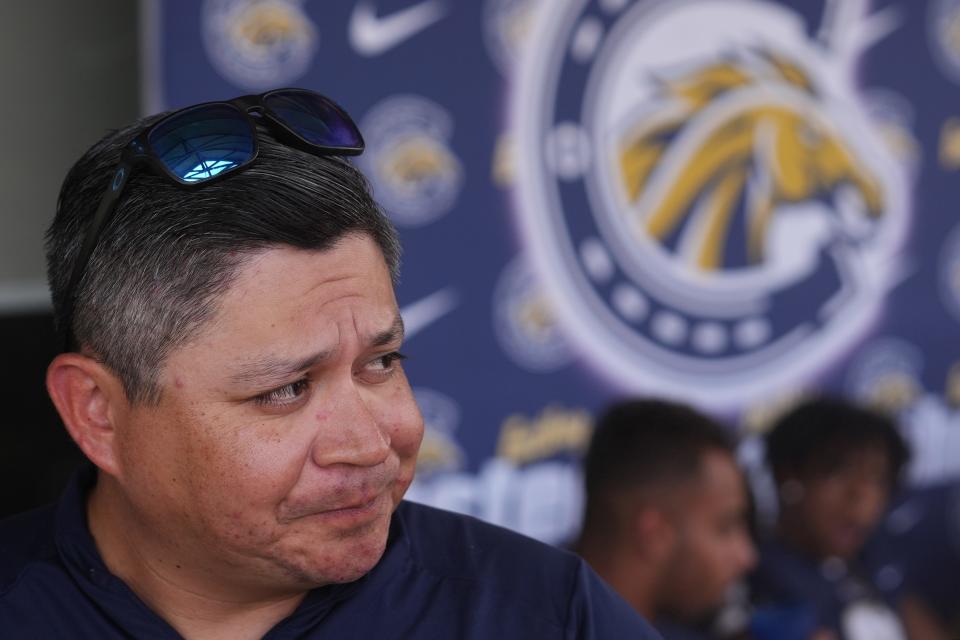
Rio Rico football coach Jeff Scurran knows this all too well. He has been leading programs since the 1970s, and will turn 76 in July. He's learned how to cope.
"Age is not a factor," Scurran said. "The experience I had helps me. I may lose a night's sleep over it, but I don't quit over it."
Numerous coaches who spoke to The Arizona Republic acknowledged the pressures of the job, but also talked about the positive reasons that keep them coaching, with helping to develop young players into responsible adults most often cited.
Ortiz acknowledged he practically lives at Perry High School, which has been his coaching home for more than year, after leading Glendale Cactus into the Open Division state football playoffs two seasons ago.
"I am single with no kids so I can balance easier than most," Ortiz said. "It's been hard to find a girl that understands the commitment. I have lost relationships due to my coaching."
Prescott Valley Bradshaw Mountain football coach Bob Young put it bluntly: "The key for coaching longevity is an understanding wife and kids."
Solving problems and a health scare
Scurran said at Rio Rico in southern Arizona, he has fewer assistants than larger schools, so he often finds himself dealing with a collection of smaller problems that normally would be handled by assistants.
"But I still run into the problem that I can't solve," he said, then citing an example.
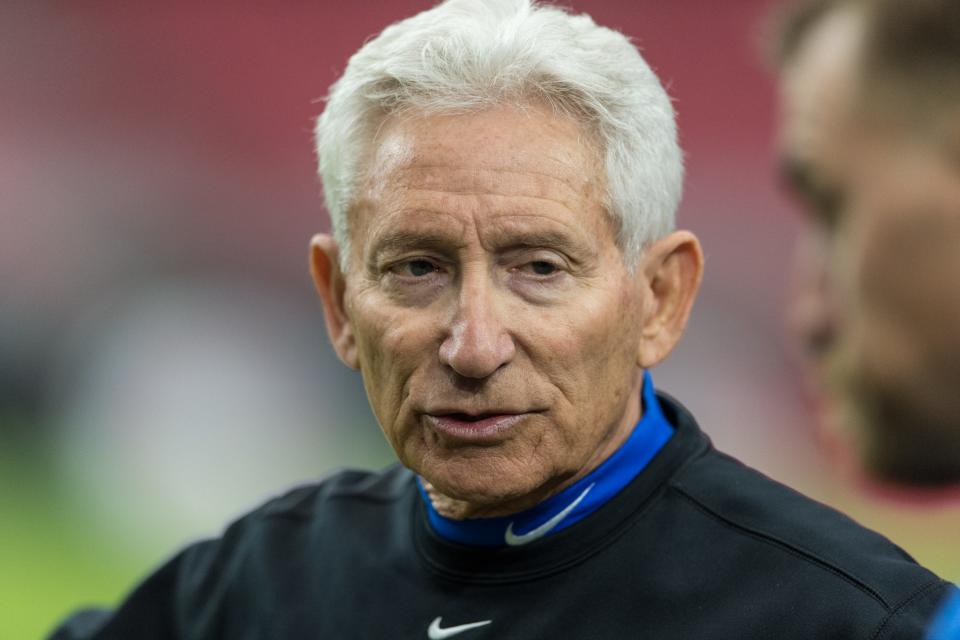
"If I don't do a pre-inventory (of equipment) now, what if I don't have enough stuff? And I got moms and dads saying, 'Those shoulder pads are wider than my kid is tall,''' he said.
Scurran figures during the football season, with so much game planning involved, he spends a good eight hours a day just on football, all while having full-time teaching duties.
"That's dealing with personal issues," Scurran said. "That's in addition to helping kids with their college recruiting, because if you don't do that, they'll leave.
"I spend 20 hours a week on Hudl (a recruiting site), looking at film. I don't want to get beat by my laziness."
He knows all about the toll it can take on one's health.
Early in the 2018 season, after his Tucson Catalina Foothills team lost to his former school, Sabino, on a night he was inducted into the Sabino Sports Hall of Fame, Scurran passed out after the game on the field. He was taken by ambulance to a hospital, where he stayed overnight and tests were run.
He came out of that OK, and continued coaching the rest of the season.
That's a health scare that could have caused him to walk away from coaching forever. But, he said, he wouldn't know what to do if he wasn't leading a team.
"When it's over, who are you and what do you do?" Scurran asks. "Maybe if I made a couple million dollars a year coaching, I'd be all right. I love traveling but I can't do that full-time. How do I pay for my grandkids' college?"
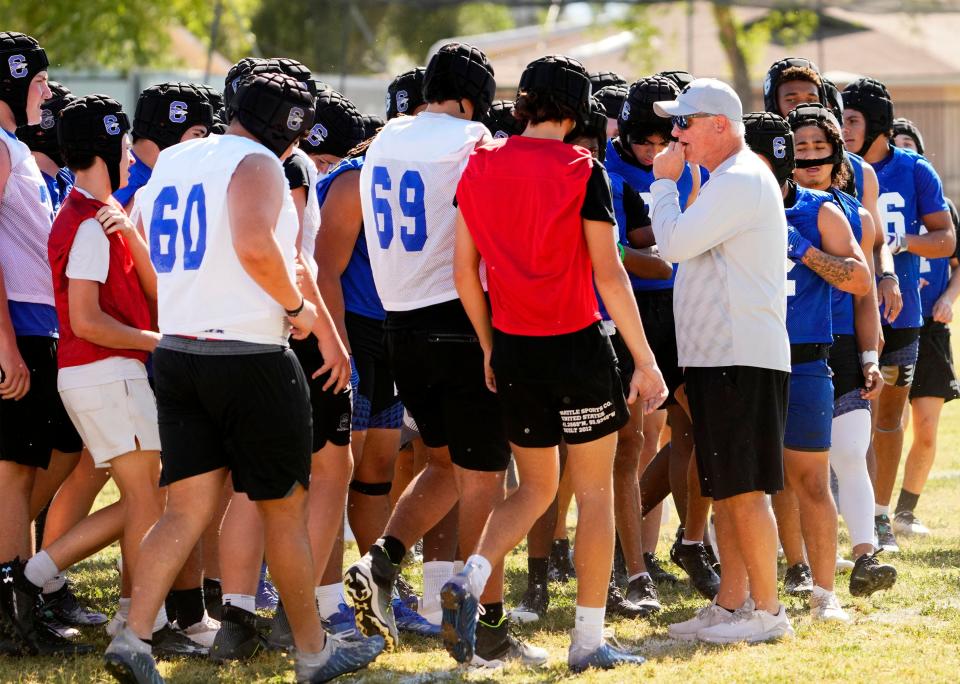
'We do it for the kids'
Chandler coach Rick Garretson assumed the Wolves' head coaching job in 2019 after Shawn Aguano left to become an assistant coach at Arizona State. Under Garretson, the Wolves won back-to-back state championships to start the Arizona Interscholastic Association's Open Division era. That gave the Wolves five championships in a row.
But winning creates pressure to keep it going, and, when Chandler lost to Scottsdale Saguaro in the Open final two years ago, then got shut out by eventual champion Basha in last season's semifinal, some wondered if the Wolves were starting to show cracks in the program.
Garretson doesn't let the outside noise get to him, staying focused on the student-athletes.
"We do it for the kids," he said. "We prepare them to the best of our abilities inside the classroom, weight room, film room and on the field.
"We prepare them to be leaders in the community. We prepare them to be accountable in all aspects of life. We don't worry about others and what they do or how they do it. We just worry about us."
The high expectations that face Chandler's program also face their city rival, Hamilton, which has a string of championships to its credit.
Coach Mike Zdebski, a Hall of Fame high school football coach in Michigan, walked into the program at a time when the Huskies were recovering from a football hazing scandal that made national news in 2018, later sinking the program to a losing season, which it had never experienced.
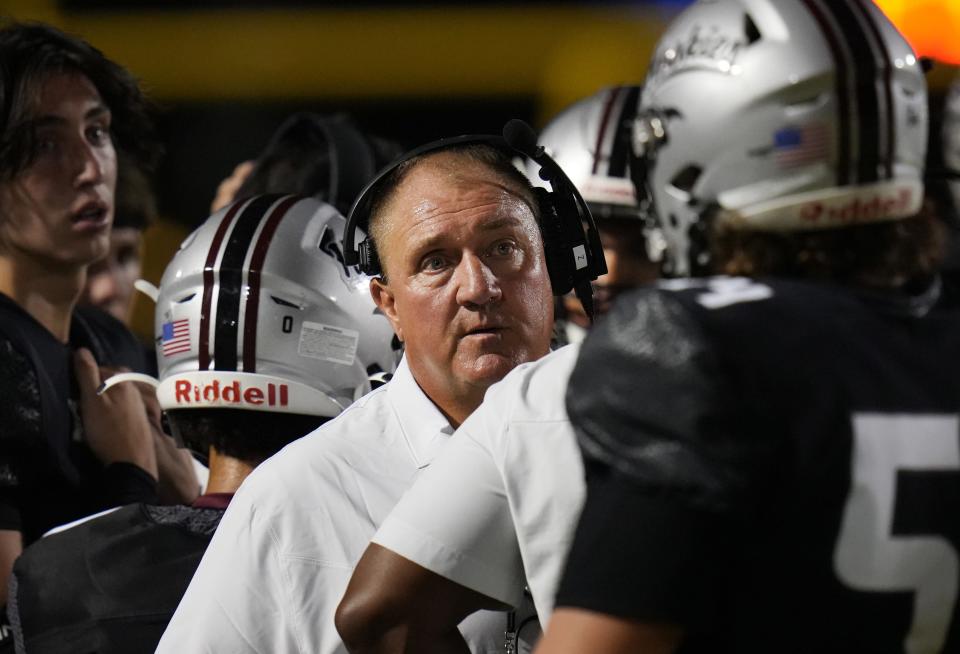
Since then, it's been a steady rise back to becoming a top contender. But even at Hamilton, there are challenges.
Zdebski said the Chandler Unified School District pays a total of 11 football coaches per school, which have teams at the freshmen, junior varsity and varsity levels. He has 38 coaches on staff between those three teams. Freshman assistants start at $2,466 and varsity assistants top out at $3,848, Zdebski said. Most of these stipends are split between two coaches, so each gets something. The rest, Zdebski said, are paid in tax credits or they volunteer.
So what drives Zdebski to keep coming back?
"The reason is relationships and development," Zdebski said. "Staff relationships become friendships. Player relationships are built upon being a positive adult figure to create better people in society."
Support from administrators
Several coaches interviewed by The Republic said a supportive administration can become a sounding board when coaches feel the heat from parents or other pressures. If administrators don't have their backs, coaches find the exit door.
This year, 40-plus coaching changes were made among schools in Arizona high school football.
Mesa Public Schools Athletic Director Tommy Eubanks understands the importance of letting coaches know he has their backs, not just those in football, but all sports because the pressures extend to them as well.
"I try my best to be present at as many events as I can throughout the year, because I understand that most coaches have families and other jobs,'' he said. "Yet they dedicate their time to the sport and the kids they care about. I'll do whatever it takes to support them because their commitment and love for the game deserve it."
Game changer: How social media has changed the game for Arizona high school coaches
Specific areas of support, such as professional development opportunities, funding the programs and upgrading facilities are other factors that can help coaches, he said.
Hamilton Athletic Director Brett Palmer acknowledged high expectations often bring more pressure on coaches. His school not only excels in football, but numerous other sports for both boys and girls. It recently won the 6A baseball championship for the second straight year.
"I think (Chandler Unified School District) and Hamilton are a unique place in the sense that the expectations are always high in every sport and, a lot of times, parents can be unrealistic with their students and coaches," Palmer said. "I try and help navigate those waters and facilitate different avenues to help resolve conflicts that come up during the school year.
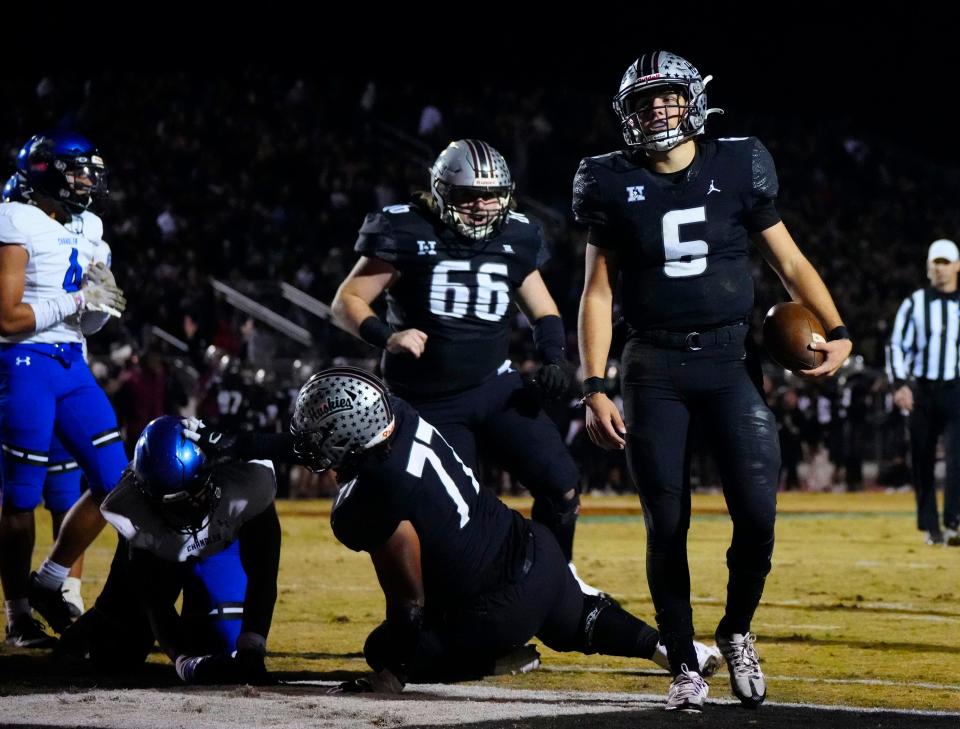
"At the end of the day, coaches are out there doing more than just coaching. They're mentoring. They're teaching. And a lot of times they are the father or mother figure that these students don't have in their lives."
Scurran has seen the difference an administration can make during his lengthy career.
"The disconnect between some administrations understanding the role of athletics in a school is profound from school to school,'' he said. "As good as some of these coaches are, you look at places like Scottsdale Saguaro, how many good coaches did they have who worked with great administrations and got (strong support)?"
Making a difference in young lives
Jason Stam, a parent in the Peoria Liberty football program, is convinced coaches are devoting so much time to parents' kids not only for the love of the game but to help develop student-athletes, not for the money. His son Jax was a standout safety and his son Keaton now is one of the state's top linebackers for the Lions.
"They do it to be the leader of men, teaching them how to work in a team environment and deal with adversity, both of which will help each one of these kids later in life," Stam said. "Many kids who may not have a good father figure or come from a single-parent household, me included, a coach is who they look at to teach them how to develop into a man."
Stam said many parents will complain if their son isn't getting enough playing time, but he believes it's important for parents to teach their kids to deal with adversity, work harder and not blame coaches.
"Coaches are going to play the best to win the game. I could go on all day about parents. Bottom line is the coaches' hourly rate may not be the best, but I have a super high appreciation for what they do and the sacrifices they make, including time away from their family for our kids."
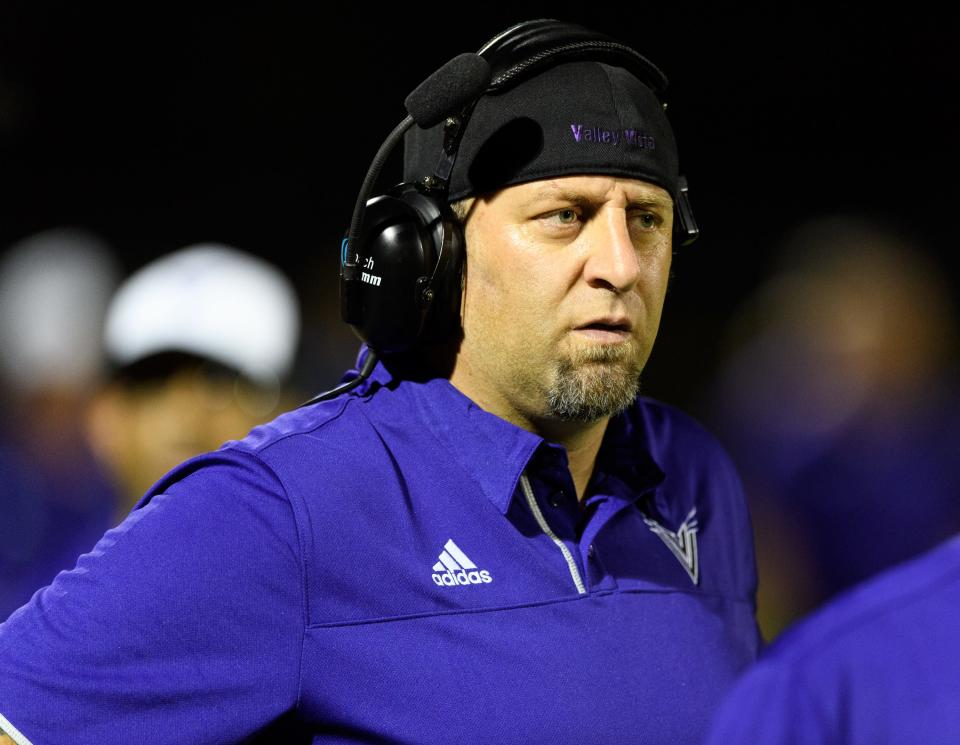
Buckeye Youngker coach Josh Sekoch credits a coach he once had for saving his life.
"Gene Legath took me under his wing, got me into teaching, mentored me and took a young 23-year-old with a drinking problem and got me set on a better path, held me accountable and reminded me of the influence a coach can have on others," Sekoch said. " I just figured it was my time to give back to others. And not sure I would teach if I wasn’t coaching."
But it comes with challenges, especially at home. Coaches often spend more time with their athletes than with their own kids.
Sekoch's first 20 years of coaching, 11 as a head coach, he didn't have children. Then, he and his wife had two children about 19 months apart. His wife works in education so they have similar schedules.
"I communicate with the kids that dad has a different job than other dads might have, that coaching, practices and games are part of my schedule,'' he said. "Then being efficient with other time, planning. We don’t do Saturdays anymore so coaches aren’t in conflict with their kids' games. Me personally, I choose late nights. I’m dad from the minute I walk in the door. And, when the kids go to sleep it’s time for football, game planning. I made a promise that I won’t miss a game or a dance recital but we also work as a family to make sure 'dad' can be there."
Bradshaw Mountain's Young, who once led Cottonwood Mingus to the state finals and also worked at Mesa Westwood and Scottsdale Notre Dame, was raised in the 1970s, finding coaching influences at Phoenix Camelback from Jesse Parker, Bill Saunders, Charlie Webb and Frank Madera.
"I knew that I wanted to be a coach when I was in high school," Young said. "I admired my coaches at Camelback. In the '70s, you couldn’t practice or train out of season, so you played multiple sports and worked on your own."
He's not so sure all of the differences seen today are necessarily better.
"The biggest change over these years has been the year-round emphasis and the extinction of the multisport athlete," he said, noting year-round training, spring and summer workouts and things like 7-on-7 camps are now expectations to compete at a high level. "I am still a big believer in kids playing more than one sport in high school and taking a little time off. "
'Coaching is a lifestyle'
The need to find balance is something not only football coaches face, but those coaching other boys' and girls' sports.
Peoria Liberty baseball coach Christopher Raymond, whose wife was an elite high school and track and field athlete, says he is blessed to have a wife who understands his coaching load.
"Baseball provides us with the best family time in the world. Our family is just very big with our players and coaches,'' he said, noting his children often are present. "Kenny has grown up in dugouts and has formed relationships that make him have hundreds of big brothers. Tristen has learned how to compete watching baseball."
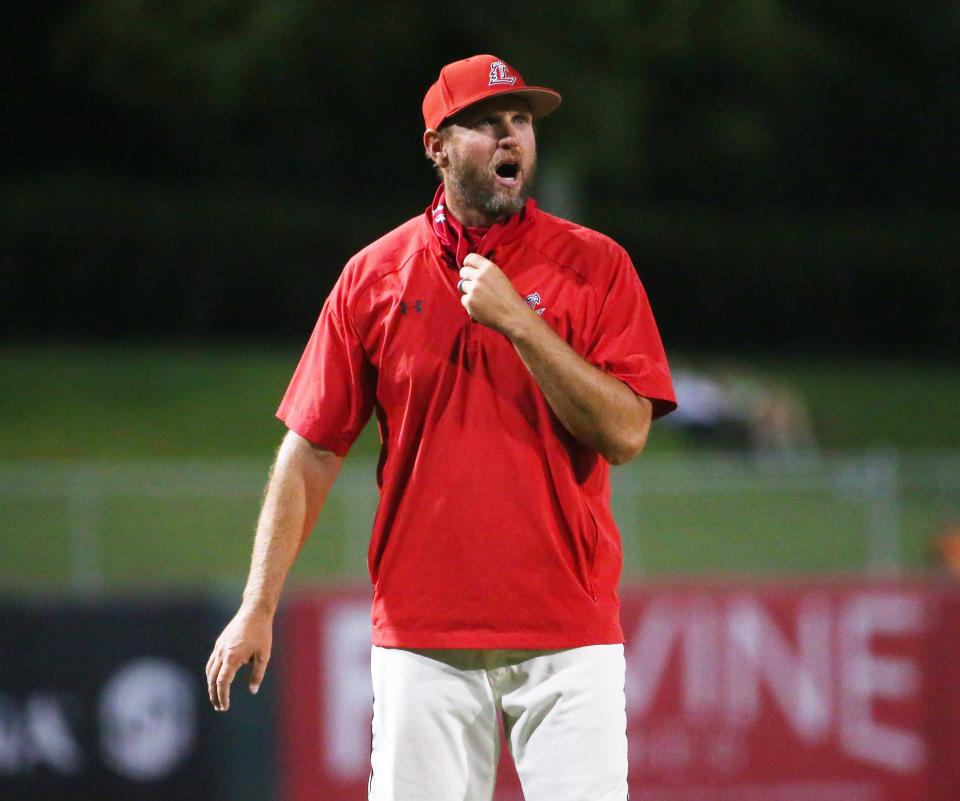
It's the same for Tolleson baseball coach Scott Richardson, who has a family of coaches.
"For me coaching is a lifestyle," he said. "My family is invested. My daughter is a cheer coach. My son-in-law is a tennis coach. My son is on my staff. My daughter-in-law is a pom coach. All at Tolleson.
"My kids grew up at the ballpark. For me, it's not about chasing championships. But everyone who hasn't won one says that. For me, it's developing kids to reach their potential and seeing how far they progress and how much they add to our community when they leave."
Shawn Lynch won a state basketball title in two different generations, at Mesa in 2004 and at Mesquite two years ago. He believes the high school coach has become a smaller piece of the basketball pie with the growth of club ball and individual trainers, as well as year-round tournaments.
Despite all of that, Lynch said, "Kids are still kids."
"And it still comes down to relationships," Lynch said, "guiding and helping kids grow as young men through basketball, competing, and the love of the game. The key is adapting as things evolve and keeping it all in the proper perspective."
Raymond echoed that sentiment.
"I will be working and not even know it,'' he said. "The drive to be successful never stops. It does not matter the time of year. You want to be great. Spending time with your players during the year is a blessing. It is awesome they want to be working and around you. It is time well-spent with our young men."
To suggest human-interest story ideas and other news, reach Obert at richard.obert@arizonarepublic.com or 602-316-8827. Follow him on Twitter@azc_obert
This article originally appeared on Arizona Republic: High pressure, low pay: What keeps Arizona high school coaches going?

